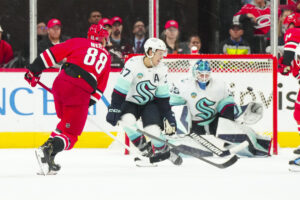The St. Louis Blues and Montreal Canadiens struck a deal sending long-time Blue Jake Allen to the Habs. While on the surface, the trade may seem small, but it has bigger implications. Montreal sent 2020 third and 2020 seventh in exchange for Allen and 2022 seventh. But, this a trade that might have been more predictable than most thought. Let us take a look at what the trade of Allen means for both teams.
Taking a Deep Dive into the Jake Allen Trade
What it Means for Montreal
This was an easy target for Montreal. Everyone saw how good Carey Price was in the playoffs. However, the Canadiens have been searching for an insurance policy. Acquiring Allen gives the Habs a goalie that can play upwards of 30 games. That means, in the 50-plus games Price starts, he’s going to be rested. The trend in the NHL is to have two reliable goalies and Allen gives them that. Despite his relatively high $4.35M cap hit, the Canadiens still sit with over $14M in cap space next year. The question is, how reliable is he?
Last season, Jake Allen was fantastic. Using numerous statistics, let’s look at how Allen ranked (among goalies with at least 10 games played):
- Sixth in save percentage (.927) and third in goals-against average (2.15).
- Sixth in GSAA/60 (0.50) and tenth in GSAA (11.04).
- First in HDSV% (.887) and first in HDGSAA/60 (0.55).
- Eight in GSAx (7.03).
It’s unlikely he repeats such a stellar season, especially on a new team. But, he doesn’t need to be quite this good. His track record as a number two goalie has been great. He’s one of the best backups in the league and Montreal now has a lethal one-two punch in the net.
What it Means for St. Louis
In a vacuum, this a good trade. The Blues add two extra draft picks, including a third-rounder for their backup goalie. The real benefit of the deal isn’t the draft picks, but the $4.35M in cap space. Now, the Blues possess slightly under $6.4M in cap space. Using Evolving-Wild’s contract projection, the Blues need $8.5M for Pietrangelo and $2.65M for Dunn. If the Blues were planning on bringing both players back, they’ll need roughly $4.8M more freed up at least. But this trade helps in that regard.
Jake Allen becoming a cap casualty isn’t a surprise. Despite his strong performance last season and playoff appearances in August, Allen lost his starting job to Jordan Binnington. The team extended 25-year-old goalie Ville Husso to a two-year $750K one-way contract during the season. So the backup job will belong to him starting next season. So, all things considered, the trade made sense. But will trading Allen hurt the Blues?
Committing to Binnington
Everyone knows how good Allen was last season. But, how was Binnington in comparison?
Among goalies with 600 minutes (10 games) played last season, Binnington placed:
- 30th in save percentage (.912) and 16th in goals-against average (2.58).
- 30th in GSAA/60 (0.07) and 27th in GSAA (3.35).
- Third in HDSV% (.867) and third in HGSAA/60 (0.45).
- 15th in GSAx (4.56).
Binnington’s overall body of work last season was fairly average. The concerns come from how his performance took a dip during the season. Here are his month-by-month save percentages from last season:
- October: .918
- November: .934
- December: .904
- January: .866
- February: .908
- March: .934
Binnington had a strong October, amazing November and his numbers plummeted after. His March sample size was fantastic but only three games. The league average save percentage was .910 and for half the season, Binnington was firmly below it. His overall save percentage was slightly above .910. But, his save percentage from December 1st to February 29th was .896. That ranked 61st among all goalies in that time span.
Betting on Husso
The salary cap is forcing the Blues to take some risks in order to keep their top players. Binnington was amazing in 2018-19 but in the world of hockey, memories are short. After Binnington failed to win a game in five postseason starts, he is under the microscope. If he falters, the Blues don’t have the same insurance policy. Ville Husso may not prove to be viable to play 30-plus reliable games. Husso’s four AHL seasons went as follows:
- 2016-17: 13-6-0 record, .920 SV% and 2.37 GAA
- 2017-18: 15-14-0 record, .922 SV% and 2.42 GAA
- 2018-19: 6-18-0 record, .871 SV% and 3.67 GAA
- 2019-20: 16-17-8 record, .908 SV% and 2.56 GAA
He has never played in the NHL, so it remains to be seen how he does. After an injury-riddled and relatively poor 2018-19 campaign, he did bounce back. Drafted in 2014, Husso has had hype ever since he came to North America from Finland.
Final Verdict
The Canadiens score an A+ in this trade. Acquiring a veteran backup with a good track record fills one of their needs. Now they’ll get the best of Price when he’s playing and fans won’t panic when he isn’t. Allen, a native of New Brunswick, also grew up a Habs fan and played junior in the QMJHL. Despite his high cap hit next season, the Canadiens are swimming in cap space. Additionally, Allen is also an unrestricted free agent in 2021. He can easily be re-upped for less money on his next deal following the expansion draft.
The Blues score a B-. The trade value was solid, but goaltending remains a question mark. If the bet on Binnington and Husso doesn’t pay off, they’ll be in trouble. The trade doesn’t free up quite enough cap space for them to extend Pietrangelo. However, it is likely one domino with a few left to fall after for them. Ideally, they’d hold onto what was a strong tandem in Allen and Binnington. But, retaining Pietrangelo has to be a top priority and the Blues are now one step closer.
Main Photo:
Embed from Getty Images






